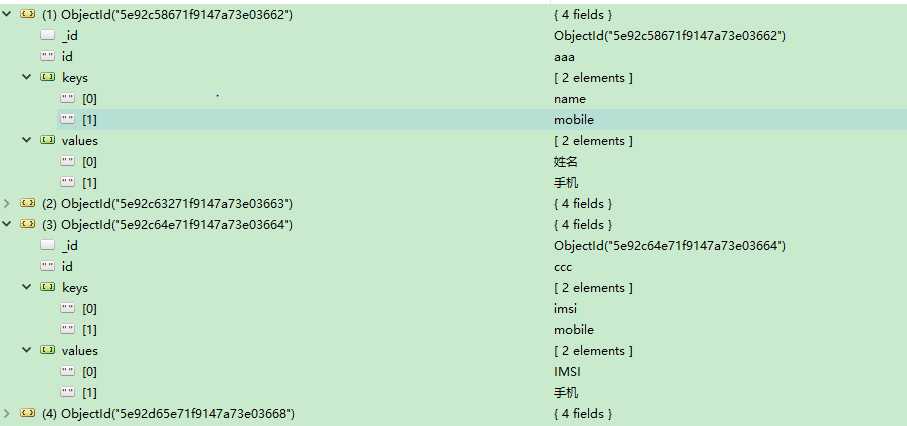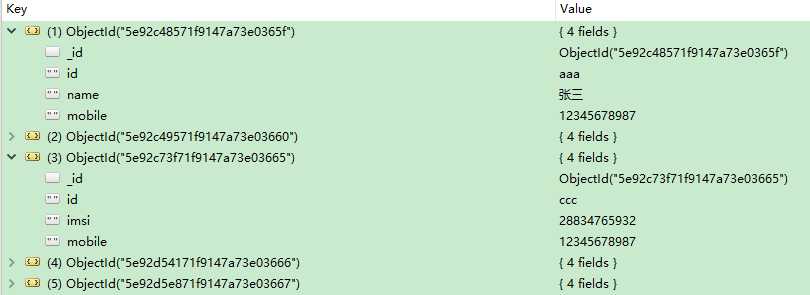标签:filter 姓名 _id ToJson nal 场景 key with list
记录一次学习java实现mongodb的两表关联查询的过程,方便日后需要用到的时候进行回顾。
场景:mongodb中有两张表,需要根据id进行关联查询。
表1数据如下:

表二数据如下:

实现两张表的关联查询,需要用到mongodb的lookup,在查询结果返回的时候,需要将没有结果集为空的数据过滤掉,此时要用到mongodb的match。
java实现需要用到mongo-java-driver包,这里使用mongo-java-driver-3.9.0.jar。阿里的maven镜像依赖如下
<dependency>
<groupId>org.mongodb</groupId>
<artifactId>mongo-java-driver</artifactId>
<version>3.9.0</version>
</dependency>
Java代码实现如下:
MongoClient mongoClient = new MongoClient("localhost", 27017);
//“test”为连接的数据库
MongoDatabase mongoDatabase = mongoClient.getDatabase("test");
//test1是表1
MongoCollection<Document> mongoCollection = mongoDatabase.getCollection("test1");
List<Bson> aggregateList = new ArrayList<>(1);
//利用lookup进行关联查询
//test2是表2,两个表根据id进行关联,关联的结果定义一个新的字段
/**Aggregates.lookup函数的说明:
* lookup(final String from, final String localField, final String foreignField, final String as)
* Creates a $lookup pipeline stage, joining the current collection with the one specified in from
* using equality match between the local field and the foreign field
* @param from the name of the collection in the same database to perform the join with.
* @param localField the field from the local collection to match values against.
* @param foreignField the field in the from collection to match values against.
* @param as the name of the new array field to add to the input documents.
*/
aggregateList.add(Aggregates.lookup("test2", "id", "id", "result"));
//利用match将没有关联到的结果过滤掉
aggregateList.add(Aggregates.match(Filters.ne("result", new ArrayList<String>(0))));
AggregateIterable<Document> aggregateIterable = mongoCollection.aggregate(aggregateList);
for (Document document : aggregateIterable) {
System.out.println(document.toJson());
}
返回结果如下:
{ "_id" : { "oid" : "5e92c58671f9147a73e03662" }, "id" : "aaa", "keys" : ["name", "mobile"], "values" : ["姓名", "手机"], "result" : [{ "_id" : { "oid" : "5e92c48571f9147a73e0365f" }, "id" : "aaa", "name" : "张三", "mobile" : "12345678987" }, { "_id" : { "oid" : "5e92d5e871f9147a73e03667" }, "id" : "aaa", "name" : "李四", "mobile" : "12345678987" }] }
{ "_id" : { "oid" : "5e92c64e71f9147a73e03664" }, "id" : "ccc", "keys" : ["imsi", "mobile"], "values" : ["IMSI", "手机"], "result" : [{ "_id" : { "oid" : "5e92c73f71f9147a73e03665" }, "id" : "ccc", "imsi" : "28834765932", "mobile" : "12345678987" }] }
整个实现过程需要对mongodb中“管道”的概念有一定的理解。比如在这个场景中,首先通过lookup将关联上的结果查询出来,再通过“管道”将结果集交给match进行过滤。
标签:filter 姓名 _id ToJson nal 场景 key with list
原文地址:https://www.cnblogs.com/wgyang/p/12686646.html